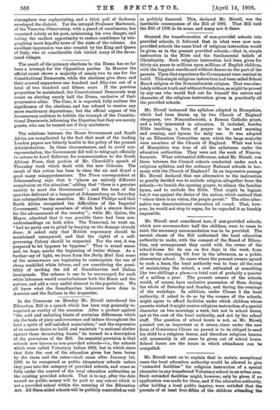Mr. Birrell next considered how, if non-provided schools, which now
accommodate half the children, were to cease to exist, the necessary accommodation was to be provided. The second clause of the Bill authorised the local education authority to make, with the consent of the Board of Educa- tion, any arrangement they could with the owner of the school-house for its use on five days in the week, from nine in the morning till four in the afternoon, as a public elementary school. In cases where the present owners agreed to such a lease, the local authority was to bear all the cost of maintaining the school, a cost estimated at something like two shillings a place,—a total cost of probably a quarter of a million a year. The present owners of the schools would, of course, have exclusive possession of them during the whole of Saturday and Sunday, and during the evenings of the weekdays. In addition, under Clause 3 the local authority, if asked to do so by the owners of the schools, might agree to afford facilities under which children whose parents wished it might receive religious instruction of a special character on two mornings a week, but not in school hours, not at the cost of the local authority, and not by the school staff. The question of school hours is not, as Mr. Birrell pointed out, as important as it seems, since under the new form of Conscience Clause no parent is to be obliged to send his child to a religious lesson, and therefore religious lessons will necessarily in all cases be given out of school hours. School hours are the hours in which attendance can be compelled.






































 Previous page
Previous page